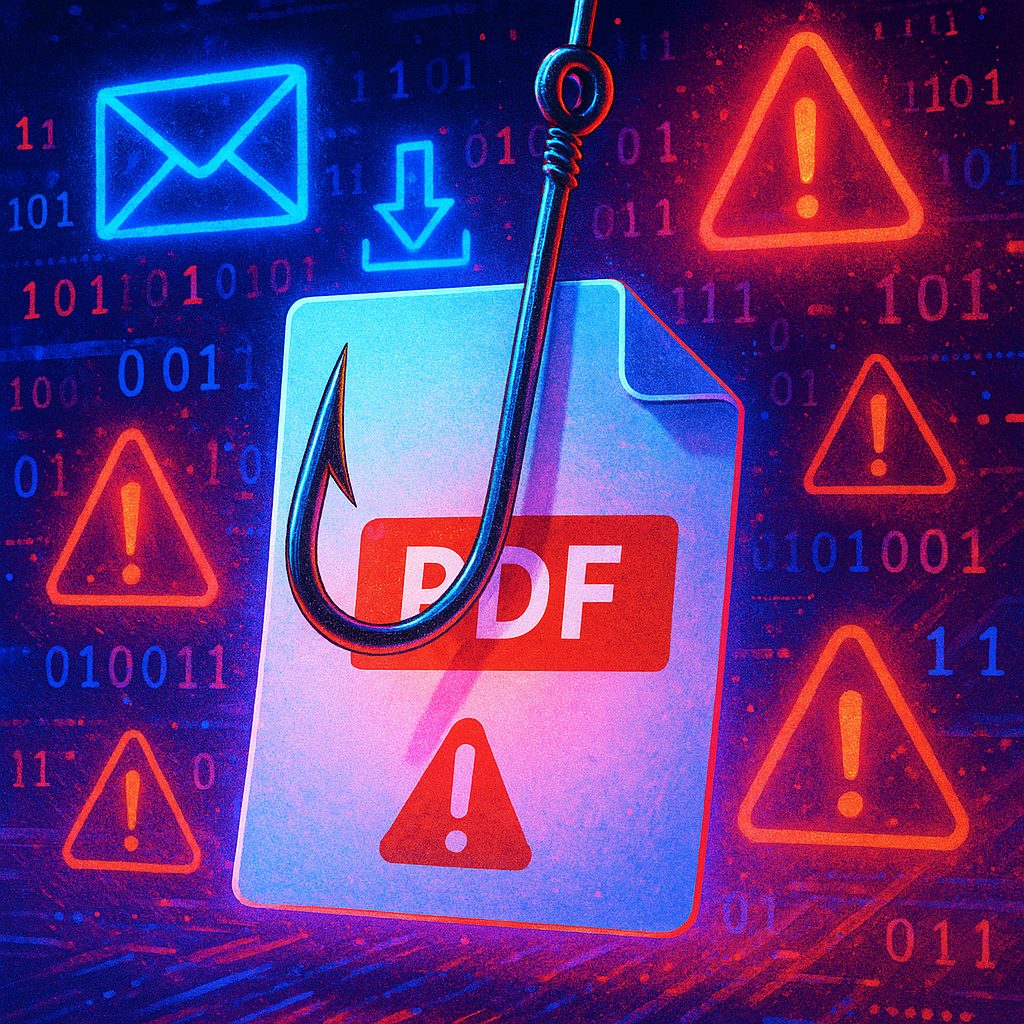
Scam of the Week: Hidden Gems
In this week's scam, cybercriminals are using Google Workspace's Gemini AI tool to try to trick you in an unusual way. You receive an email that appears ordinary, and it doesn’t have any suspicious links or attachments. But if you ask Gemini to summarize it, the results seem alarming. Gemini’s summary of the email shows you urgent warnings about your password being compromised, along with a support number for you to call so that you can resolve the problem. However, this warning from Gemini is completely false!

Scam of the Week: When PDFs Become Phish-Delivering Files
In this week's scam, cybercriminals are trying to trick you with PDFs that contain malicious content. You receive an email with a PDF attachment that appears to be from a major organization like Microsoft, DocuSign, or PayPal. The subject of the email seems alarming and makes it appear that you have an issue with your account. If you open the PDF attachment, it contains official logos and professional formatting. It appears legitimate, and the instructions direct you to call a customer service phone number.


Scam of the Week: WhatsApp with This Phone Number?
In this week's scam, cybercriminals are using phone calls to try to scam you. This type of scam is also known as vishing. You receive a strange call on WhatsApp, a calling and messaging app. The call is from an unknown number, and when you answer, you hear a robotic voice that asks you to add a phone number to your WhatsApp contacts. The call then quickly ends without any further explanation. It seems unusual, but harmless.

Scam of the Week: A Fine Way to Get Scammed
In this week’s scam, you receive a text message that appears to be from the Department of Motor Vehicles (DMV). The text states that you must pay a traffic fine by a certain date. If you don’t pay on time, your vehicle registration will be suspended, and you’ll lose your driving privileges. Some versions of the message even state that you’ll go to jail or your credit score will be affected if you don't pay.


Scam of the Week: Don’t Sail with These Scammers
This week, cybercriminals are targeting travelers by using online advertisements as part of a scam, also known as “malvertising”. If you book an ocean cruise and have questions about your reservation, you probably search Google to find a customer service phone number. The top search result is a sponsored Google Ad that appears legitimate, and even contains a phone number.

Scam of the Week: Don't Make This Smish-take
In this week’s scam, you receive an unexpected text message that makes it appear that someone is trying to log in to your email or social media account. The message contains a multi-factor authentication (MFA) code and what appears to be a customer support number for you to call if you did not request the code. These types of codes are usually only sent to you when you are logging in to an account. If you receive one unexpectedly, it might make you think an unauthorized person is trying to access your account.


Scam of the Week: Scamazon Prime
This week, cybercriminals are targeting Amazon Prime customers located in France. You receive an email stating that your Amazon Prime subscription will automatically renew. The email contains your name and address, making it appear convincing. It claims your subscription will automatically renew, but at a very expensive cost.

Scam of the Week: Deepfake, Deep Trouble
In this week’s scam, cybercriminals are using artificial intelligence (AI) to try to trick you into clicking malicious links. You receive a text message or voice call from someone claiming to be a senior United States government official. They will try to establish a friendly relationship with you by sounding genuine, making the official seem trustworthy.


Scam of the Week: Don’t Call These Crypto Criminals
In this week’s scam, you receive an email that appears to be from Coinbase, a platform that allows you to buy, sell, and store cryptocurrency (crypto). The email says that a new wallet address has been set up to make withdrawals from your account. Wallets are tools that are used to manage crypto that you sell or receive. An unexpected email about a new wallet might alarm you, since it might seem like someone is making unauthorized purchases on your account.

Scam of the Week: The Social Security Swindle
In this week's scam, you receive an email that appears to be from the United States (US) Social Security Administration (SSA), a retirement program run by the US government. The email says your SSA financial statement is now available. It even has an official SSA logo and provides instructions for viewing your statement by downloading an attachment.

Scam of the Week: Device Code Hijacking
Cybercriminals have come up with a new way to scam you by using device codes, which are numeric codes that allow you to log into the same account using multiple devices. You may have used these codes in the past. If you’ve ever attempted to log in to a streaming service such as Netflix from your TV, your TV will display a numeric code that you can enter on your phone. Once you enter the code on your phone, your TV will be automatically logged in to your Netflix account, without needing to log in each time you watch.

Scam of the Week: When Mourning Meets Malware
Unfortunately, cybercriminals often use sad news to trick you. Scammers are taking advantage of Pope Francis' recent death by using AI to create fake images and news articles about the event. They post this phony information on social media accounts in hopes of capturing your attention. However, if you click the links in these social media posts, they’ll take you to harmful websites that steal your personal and financial information.

Scam of the Week: It's No Secret That This Cash Grab Is a Scam
In this week’s scam, someone calls you claiming to be a representative of a big retailer, such as Amazon. They warn you that criminals have taken over your account and are using it for illegal activities. You are told that you will be transferred to a government agent who is investigating the account. The agent claims that the criminals have also compromised your bank account and have access to all your money.

Scam of the Week: Hello... Is It Scams You're Looking For?
In this week’s scam, you receive a text message from an unknown phone number that reads “Hello.” The message seems harmless, and you might think it’s a genuine text meant for someone else. Because the message appears friendly, you may be tempted to respond.

Scam of the Week: A Text Message Trap
In this week’s scam, you receive a text message that says you have an unpaid invoice, fee, or toll. It seems legitimate because the text message appears to come from a local organization, such as your government’s toll service, tax office, or postal service. It may even contain official logos and branding. The text instructs you to click a link so that you can pay the bill, or you will face a penalty.

Compliance Best Practices for 2025
As we look toward 2025, one thing is clear: regulatory compliance is more important than ever. With an ever-changing landscape of laws, data protection regulations, and cybersecurity threats, business leaders must stay ahead of the curve to protect their organizations, avoid costly penalties, and build trust with customers.
While compliance may seem like a complex and evolving challenge, adopting the right habits can help streamline the process and make it easier to maintain. Let’s dive into some key compliance best practices for 2025 and explore 3 essential compliance habits every business leader should adopt to keep their business secure, lawful, and thriving.
